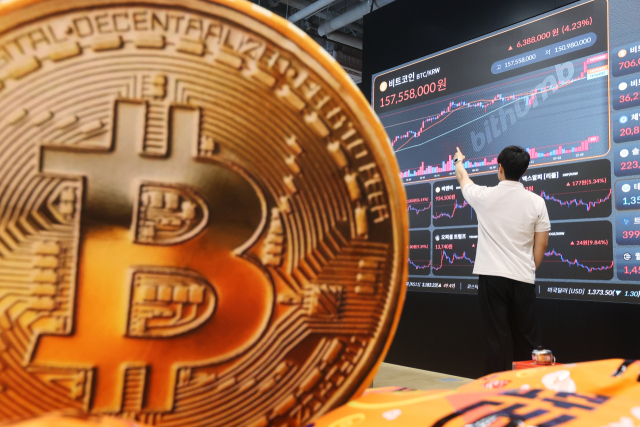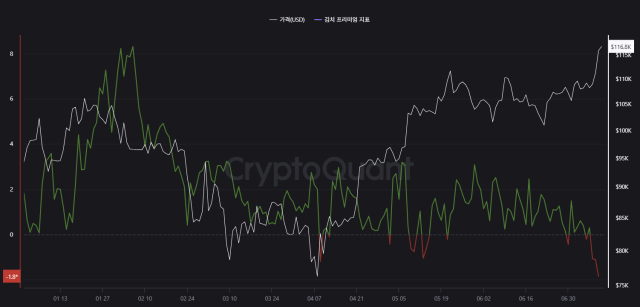
Although Bitcoin (BTC) prices continue to hit new highs daily, the domestic market is losing its presence due to decreased trading volume and the 'reverse kimchi premium' phenomenon. In the past, domestic cryptocurrency prices were 12% higher than overseas, but recently they have been lower. The industry analyzes that this is due to domestic investors increasingly moving abroad.
According to blockchain data analysis company CryptoQuant on the 11th, the BTC price formed at major domestic exchanges was about 1.85% lower than the overseas average price the previous day. The so-called 'reverse premium' phenomenon is becoming more apparent.
Related Articles
- Ahead of corporate investment permission... Upbit and Bithumb ignite high-net-worth asset owner competition
- "Maximum collateral up to 4 times"... Bithumb launches 'Coin Lending Service'
- "Bitcoin surpasses $112,000... Ignited the asset management market" [S Money-Plus]
- Bitcoin sets new record... Surpasses $116,000 [Decenter Market]
The domestic cryptocurrency market was typically characterized by the 'kimchi premium' phenomenon, where major cryptocurrency prices were higher due to limited institutional and foreign participation. Especially during bull markets, the kimchi premium would soar as supply couldn't keep up with high market demand. In fact, when BTC first exceeded 100 million won last March, the domestic price was about 12% higher than overseas.
However, since the BTC spot ETF was launched in the US last year, the market leadership has shifted overseas, and the domestic market has become increasingly marginalized. As a result, there are assessments that the reverse kimchi premium phenomenon, where domestic prices are lower than overseas prices, has become more frequent.

The domestic market contraction is also prominent in terms of trading volume. According to a centralized cryptocurrency exchange (CEX) market share report published by CoinGecko on the 30th of last month, Upbit's trading volume in the first quarter dropped by 34% compared to the previous quarter, the largest decline among the top 10 exchanges. During the same period, the world's largest exchange Binance decreased by only 15.7%, while MEXC's trading volume slightly decreased by 1.8%.
Actually, as of 3 PM on the 11th according to CoinMarketCap, Upbit's 24-hour trading volume was about $3.2 billion (approximately 4.4032 trillion won), dropping to 33rd among all exchanges. Compared to Binance's trading volume of about $30.7 billion (42.2432 trillion won) during the same period, the trading volume difference has widened to 10 times. The trading volume of Bithumb, the second-largest domestic exchange, remained lower at $1.9 billion (approximately 2.6144 trillion won).
The industry sees this as an acceleration of domestic investors' exodus. An industry official said, "While global major exchanges like Binance and Bybit support various derivative products such as futures and leverage, domestic exchanges are limited to spot trading, narrowing investors' options" and "Investors seeking higher profits in a bull market are naturally moving to overseas exchanges".
With the domestic market unable to gain momentum, the second-quarter results of exchanges expected to be announced soon might not meet expectations. As competition for market share intensifies among exchanges, led by Bithumb, which is pursuing a KOSDAQ listing in early next year, marketing and personnel expansion costs are increasing. According to the first-quarter disclosure, Bithumb's first-quarter operating expenses were 126.9 billion won, a 67% surge from the same period last year (76.2 billion won). Advertising expenses, in particular, exceeded 9.6 billion won, more than five times the previous year.
Recently, Upbit and Bithumb have introduced services allowing short selling and leverage trading of cryptocurrencies to prevent investor exodus. However, these services are operating in a regulatory gray area due to the lack of clear regulations. According to the financial sector, the Financial Services Commission is reviewing whether the two exchanges' coin lending services fall under the money lending business.
The industry suggests that rapid institutionalization is necessary to restore domestic market competitiveness. There are concerns that prolonged legal uncertainty could make it increasingly difficult to diversify exchange revenue models.
- Reporter Kim Jung-woo
< Copyright ⓒ Decenter, unauthorized reproduction and redistribution prohibited >







